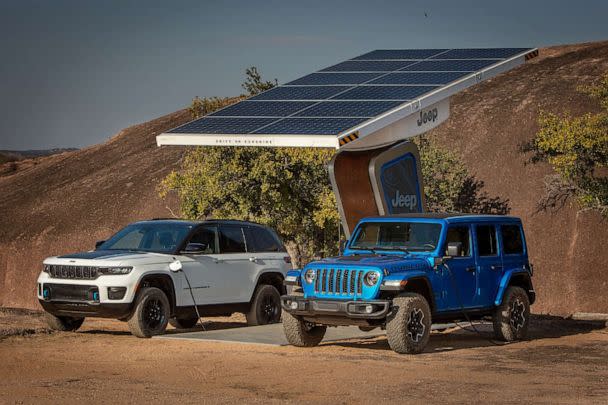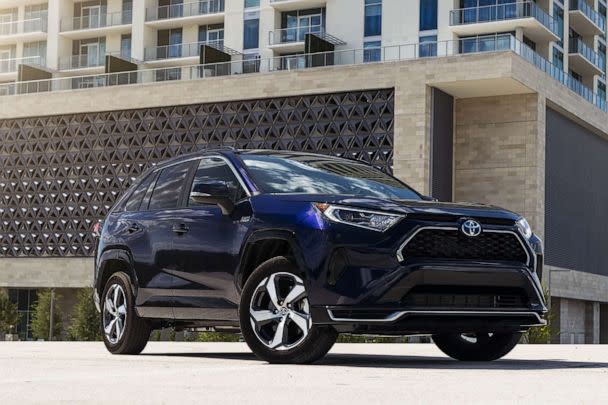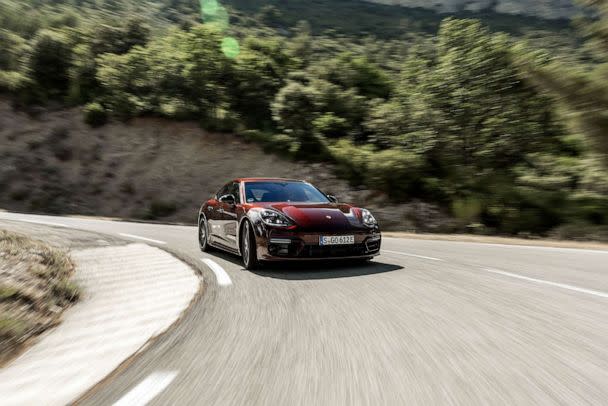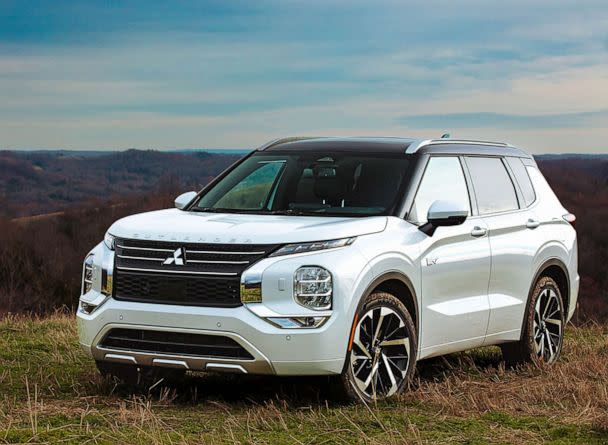New to electrification? Try a plug-in hybrid first
Let's be honest: electric vehicles can get a bad rap.
Maybe it's range anxiety. Or the scarcity -- and uncertainty -- of public charging stations. Both are valid reasons why some Americans are dubious of electric vehicles.
More industry watchers are now arguing a plug-in hybrid (PHEV) may be the "ideal" powertrain of choice for those wanting to try out EVs. Plug-in hybrids have a gasoline engine, at least one electric motor and a battery pack, which can be charged via regenerative braking or a plug. Some PHEVs can even travel up to 60 miles in electric mode.
They were once seen as a temporary solution to EV adoption. Not anymore.
"The reality is electric vehicles won't work for everyone -- not now, not in the next five or even 15 years," Robby DeGraff, an analyst at AutoPacific, told ABC News. "There will always be people living in apartments or homes who don't have a place to plug in. We should not be forcing EVs on people."
DeGraff said the EV charging infrastructure lags in Milwaukee, Wisconsin, where he lives. He can count the number of level 3 chargers in the city, adding that many are often broken or offline. He attributes the excitement around EVs to Tesla, the top-selling EV automaker in the U.S., noting that the "Tesla buzz" hasn't stopped even with the increased competition.
"If you're a consumer toying with the idea of an EV ... you look at the Tesla charging network, which is fantastic," he said. "Teslas are still very desirable and hot."
Last year 186,400 PHEV units were sold in the U.S. versus 774,000 battery electric vehicles (BEV). AutoPacific predicts sales of plug-ins to hit 305,000 this year and 425,900 in 2024. There are currently 51 PHEVs (including cars, SUVs, crossovers and one minivan) on the market and 61 BEVs. DeGraff said consumers would buy more PHEVs if they were aware of the benefits of owning one.
"They're more affordable than a common electric vehicle and operate like a traditional hybrid when the electric range is out," he said. "They have more flexibility ... I think they're perfect."
The No. 1 selling PHEV in the U.S. is the Jeep Wrangler 4xe, which launched in 2021. The Wrangler 4xe now accounts for 24% of all Wrangler sales and more than 43,100 units were sold in 2022. (The 4xe is available in Willys, Sahara, High Altitude and Rubicon models.) Jeep then debuted the Grand Cherokee 4xe in late 2022.

The Wrangler 4xe gets 21 miles of electric range; the Grand Cherokee 4xe tops out at 25 miles. Jeep, part of the Stellantis automotive conglomerate, will introduce even more electrified models by 2025.
"By 2030, more than 50% of Jeep brand sales in the United States will be fully electric," a spokesperson told ABC News.
MORE: Electric vehicle drivers get candid about charging: 'Logistical nightmare'
Japanese automaker Toyota will add the latest generation of its Prius Prime this spring following the success of the RAV4 Prime sport utility vehicle, which has an EPA-estimated electric range of 42 miles.
"The demand for our Prime vehicles exceeds our ability to manufacture them," a Toyota spokesperson told ABC News. "Almost every RAV4 Prime is pre-sold before they hit the lots. With the design and features of our all-new 2023 Prius Prime, we expect the same customer demand when it goes on sale."

Toyota, a pioneer of hybrid technology, recently said it would focus more attention on BEVs, a significant shift for the company. Plug-in hybrids, however, will still be available to drivers who prefer them.
"Our strategy will continue to evolve as we work to meet customer demands but PHEVs will continue to be a piece of that strategy," the spokesperson said.
Karl Brauer, executive analyst at iSeeCars.com, said plug-in hybrids have "zero downside" for owners, especially since they can be easily charged with a standard, 110v outlet -- no pricey external charger required.
"With a PHEV you're not at the mercy of the public charging infrastructure, which is still pretty lacking," he told ABC News. "You will never face lines or deal with non-functioning chargers."
Many PHEVs can qualify for state and federal tax credits, too. PHEVs may weigh more than non-hybrids but the instant torque from the electric motor will immediately satisfy drivers, Brauer said.
"PHEVs are the most complex type of car and the tech keeps getting better and better," he said. "Battery packs are getting more efficient and lighter. The newest versions won't suffer weight penalties as earlier models did."
Mitsubishi Motors has been producing a plug-in version of its Outlander for a decade. The electrified SUV was a hit globally and landed in the U.S. in 2018. The niche automaker recently unveiled an updated Outlander PHEV with boosted electric range (38 miles), a third row and improved styling and handling.
"We essentially invented the segment," Cason Grover, Mitsubishi Motors North America director of product planning, told ABC News. "The Outlander was a huge success for us, surprising a lot of people. It set us on a really good path."

Grover touted the "surprising acceleration" of PHEVs, adding that electrification "brings lots of benefits." He agreed that pairing a gasoline engine with an electric motor eliminates the fears drivers share about EVs.
"It's nice to have that ability to drive long distances with an internal combustion engine," he said.
Luxury automakers like BMW, Porsche and Bentley have also been making PHEVs for years. BMW recently added the XM, a high-performance plug-in hybrid SUV that produces a combined 644 horsepower and 590 lb-ft of torque from a twin-turbo V8 engine and electric motor.
The modish SUV can travel for 30 miles as EV before the 4.4-liter engine kicks in. Plus, the battery charges from zero to 100% in 3.25 hours, BMW says.
Bentley pairs a turbocharged V6 engine with an electric motor in its plug-in hybrid Bentayga and Flying Spur. The vehicles are powered by a 18.0 kWh lithium-ion battery that can be recharged in as little as two-and-a-half hours. The electric-only range on the Bentayga hybrid is at least 28 miles; the Flying Spur hybrid gets 25 miles in EV Drive mode.
MORE: 1st hybrid Corvette unveiled: What to know about the E-Ray
German automaker Porsche sells more plug-ins overseas but the company's all-electric Taycan has actually boosted interest in the company's hybrids in the U.S., according to a spokesperson. Porsche launched the Panamera E-Hybrid in 2013 followed by the Cayenne E-Hybrid a year later.
"The Taycan has acted as a lighthouse and drawn the attention of non-traditional Porsche customers to the availability of a PHEV model range," the spokesperson told ABC News.
The E-Hybrids have an EPA-tested range of 15 and 14 miles.
"In the real world, drivers found they would get 20% more range than listed," the spokesperson said.

Plug-ins are starting to revolutionize the supercar world as well. Ferrari's SF90 Stradale pairs a twin-turbocharged V8 with three electric motors, giving the car aphrodisiac qualities and mind-blowing acceleration.
McLaren's Artura, the British's marque new plug-in hybrid, delivers sleek styling, scintillating performance and insane speeds with minimal to no emissions. Owners can drive in silence for 19 miles before the twin-turbo V6 engine awakens.
Nicolas Brown, president of McLaren the Americas, said customers are not demanding a pure EV quite yet.
"Our focus is on high-performance hybrids," he told ABC News. "This hybrid ticks all the boxes and the driver experience isn't compromised. The battery technology isn't there yet to have a true, all-electric track car."
Brauer expects the electric range of PHEVs to increase in the coming years, with 100 miles a real possibility. Now, automakers have to do more to educate motorists about these vehicles, he argued.
"It's unfortunate the average consumer isn't more aware of plug-ins," he said. "If you look at all the pros and cons of drivetrains, PHEVs would be that much more popular."
New to electrification? Try a plug-in hybrid first originally appeared on abcnews.go.com

 Yahoo Autos
Yahoo Autos 